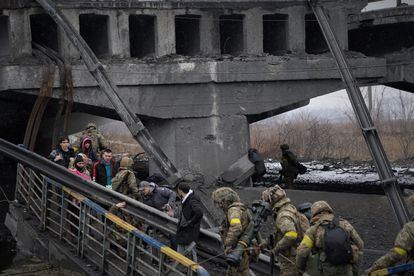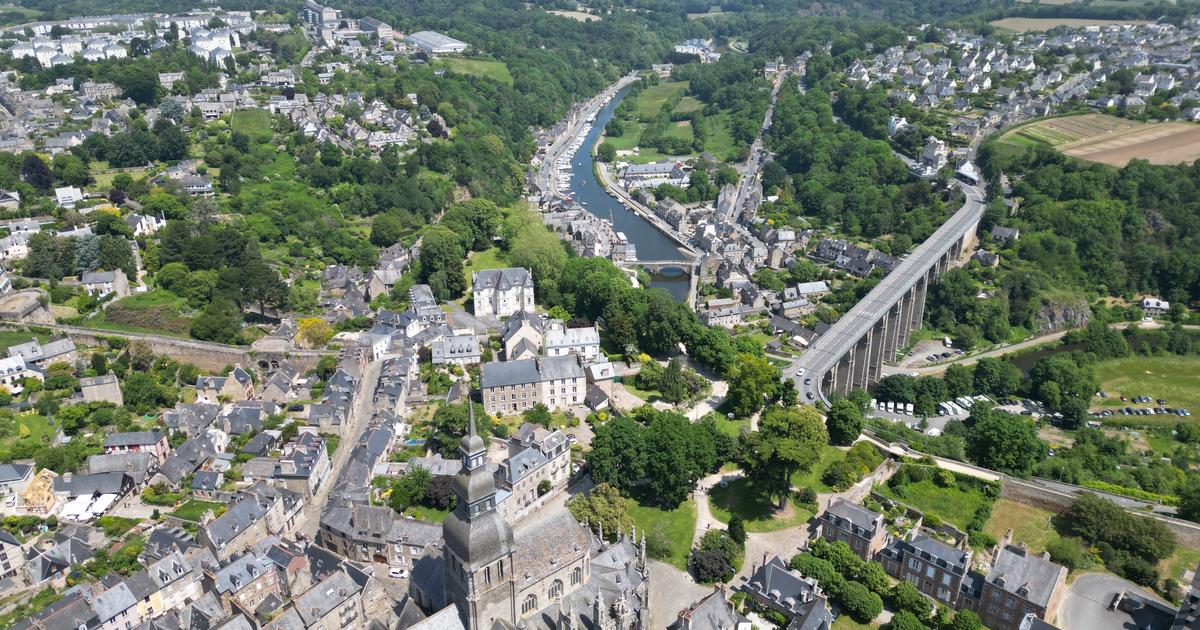The Ukrainian Army is breaking down the bridges.
It is not figurative language to express the enormous distance in the diplomatic field that separates them from Moscow.
It is verbatim.
Life itself in armed conflict since Russian troops began attacking this former Soviet republic a week ago.
In an attempt to put a stop to one of the most powerful armies in the world, the Ukrainian military has decided to blow up its own infrastructure before the Kremlin's tanks and tanks use it to ruthlessly enter Kiev, the capital.
"It seems that it has worked, because we have been in the war for seven days and they are not yet in Kiev," says a satisfied Alexander, 26, one of the soldiers who commands the rearguard post located in the small town of Romanov,
More information
Last minute of the Russian invasion of Ukraine, live
Snow falls on the waters of the Irpin River.
The place is now a quagmire amid huge cement blocks, iron mounds, broken pipes and raised asphalt crust.
Next to this tributary of the Dnieper, the bangs can be heard coming from the front line, a few kilometers further north.
“They are from the Ukrainian Army”, clarifies the soldier, in a reassuring tone, to insist on the idea that they have the square under control.
He himself explains that they dynamited the bridge, as they did with others, on the second or third day of the war without endangering the lives of civilians to stop the enemy at a time when the fighting had reached Romanov.
Since then, a white van has been stranded in the lively but shallow waters of the Irpin River, which also gives its name to the neighboring town.
From there, hundreds of inhabitants fleeing the conflict arrive in an incessant trickle to the south.
They have to cross the precarious footbridge that has been set up and through which even the dogs have to take extreme precautions so as not to end up in the water.
Until Tuesday almost a million people had escaped the conflict through different borders of the country, according to data from the UN agency for refugees (Acnur).
The majority, 874,000, have made it to the west.
In addition, some 96,000 fled to Russia from the Donetsk and Lugansk regions, which are in the east of the country and are partly controlled by pro-Russian militias.
A militiaman helps several people to cross over the remains of the bridge over the Irpin River, on the outskirts of Kiev. Luis de Vega
"Glory to Ukraine, glory to our heroes," repeats a woman after being helped by one of the armed militiamen who control the river crossing.
It is Valeriy, 37 years old and a resident of Romanov, which has about 2,000 inhabitants, but where today there is hardly more than a handful of men with their rifles who help the Army.
Valeriy confirms that the blasting of the bridge took place at dawn on Friday and explains that the moments when the fighting is most felt are in the late afternoon and at night.
Behind, among the snowy grove, the first houses appear.
Some have also been hit by gunfire.
"Russians are everywhere"
"The Russians are everywhere and our aviation and artillery work especially in the northern area of Irpin and in Bucha," admits Alexander himself, the military man, while several families arrive from there with their luggage to cross the river on the remains of the bridge.
Some do the route with their pets.
That fence to which, according to the official himself, the Russian troops are subjecting Kiev, forces these citizens to seek escape to the center of the capital as an escape valve, where the train station continues to be the main umbilical cord with other areas of the country, especially with the west, the least affected by the conflict.
Kiev Governor Oleksii Kuleba warned Wednesday afternoon that Irpin and Bucha are among the most dangerous areas surrounding the capital.
Between tears Cristina arrives, 30 years old.
“An explosion fell near our house and we had to walk to Kiev to leave Ukraine.
We are going to a safer country like France, where my mother lives.”
The two go together in the company of a neighbor to get on the first train they can to the west.
The mother was on vacation in the Ukraine and she was to have returned to France, where her husband is, just on Thursday.
That was the day that Russian President Vladimir Putin chose to order his troops to invade and attack the country.
The landscape that Cristina leaves behind her is devastating.
Ukrainian soldiers go to the Irpin front from the town of Romanov in the opposite direction to the civilians who are fleeing the fighting. Luis de Vega
At the top of the road, where the asphalt suddenly ends giving way to destruction, two young soldiers dig a trench with shovels while they go through the suitcases and documents of those who are heading towards Kiev.
A few meters further on, flowers shine before the monument to those who fell in World War II.
It is right in front of the Romanov Orthodox Church, also hit by bullets, where a police van is picking up those trying to advance towards the capital.
The road runs through pine forests, where the troops are also prominent, and is marked by checkpoints in the hands of armed civilians next to barricades.
A small square in Romanov in front of a supermarket is the post where the Ukrainian troops organize themselves in the rear in this area of the conflict.
Some disassemble and clean their weapons, others do some shopping, others climb on the armored vehicles... In the surrounding buildings, also with wounds from recent combat, some soldiers peek out like sentinels between the broken glass.
A file of a dozen soldiers in combat gear is walking to the front.
They have no choice but to walk over the wreckage of the bridge they blew up and go the other way than the civilians escaping the armed melee.
Meters before putting his boots on the bars that separate him from the riverbed, one of them decidedly launches: “Russian barbecue”.
Several civilians are fleeing the war over the remains of the bridge over the Irpin River, about twenty kilometers from the center of Kiev, which was blown up on February 25 by the Ukrainian army to try to prevent the arrival of Russian troops in the capital. LOUIS DE VEGA
Follow all the international information on
and
, or in
our weekly newsletter
.













